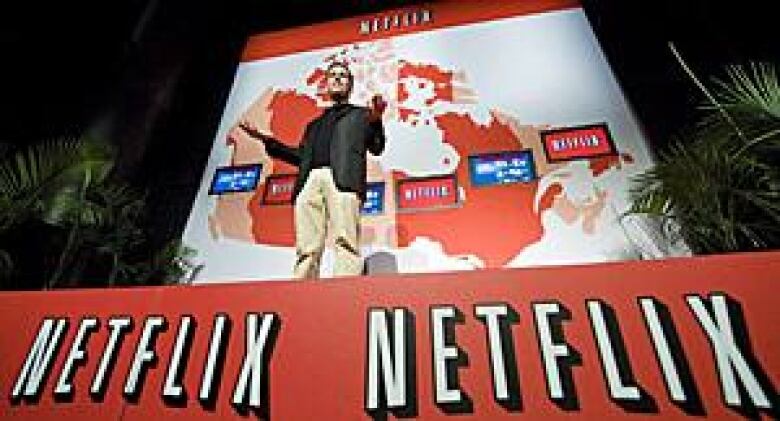But is it broadcasting?
CRTC says Netflix is not a broadcaster, but broadcast industry begs to differ
Let's play a little game. One of these things is not like the others: CBC, CTV, Global, Netflix.
If you guessed Netflix, you win. In the eyes of Canada's telecommunications authority, the CRTC,Netflix, which allows viewers to stream video content via their computers,Blu-ray players or game consoles,isn't considered a "broadcaster." But some industry groups think it should be.
Part of being a broadcaster in Canada means that you're obliged to support Canadian programming. It's right there in the Canadian Broadcasting Act: "each element of the Canadian broadcasting system shall contribute in an appropriate manner to the creation and presentation of Canadian programming."
Practically speaking, this means that Canadian broadcasters are required to give a percentage of their annual revenues to organizations like the Canadian Media Fund, which helps pay for new Canadian content. Basically, if you want to run a TV station, you need to help pay for Canadian TV programming. Broadcasters have to do this.
But here's the thing: the Canadian Radio-television and Telecommunications Commission doesn't consider online video streaming services like Netflix to be broadcasters, so they can distribute movies and TV shows without the same requirement to help fund new Canadian productions.
'It's not broadcasting'
Late last week, a group of Canadian film and television companies got together during an industry conference to talk about this issue. In addition to a panel discussion that was part of the official conference program, there was also a separate, private meeting, organized by the Canadian Media Production Association. The CBC reported that it included cable companies, broadcasters and union representatives, and the topic of conversation was, essentially, "What do we do about over-the-top (OTT) services like Netflix?"
The same day, the chairman of the CRTC, Konrad von Finkenstein,was quotedas saying, "It's not broadcasting, within the Broadcasting Act." I clarified this with a representative from the CRTC, who told me that companies like Netflix fall under the CRTC'snew media exemption.
Back in 1999, the CRTC said, "new media broadcasting undertakings are not subject to licensing by the commission." In 2009,it saidbasically the same thing: "While broadcasting in new media is growing in importance, we do not believe that regulatory intervention is necessary at this time. We found that the internet and mobile services are acting in a complementary fashion to the traditional broadcasting system."
That was, of course, more than a year before Netflix started streaming movies and TV shows to Canadians. Now, in 2011, I'm not so sure that "complementary" is the right word to describe services like Netflix in relation to traditional broadcasters. "Competitive" is probably more accurate.
Why we should care
So, who cares, aside from traditional broadcasters? Well, if you're concerned about the amount of homegrown content that's produced in this country, you might care, because Netflix's new media exemption meansless money for new Canadian television productions. Or, if you're a Netflix customer, you might care, because if the CRTC were to decide that it should regulate these services and treat them more like traditional broadcasters, we'd probably see prices go up from the current $7.99 a month.
But for me, the biggest reason Canadians should care is the precedent it could set. Netflix is just the thin edge of the wedge. What happens (or doesn't happen) with Netflix will affect whether we see other online streaming services like Hulu, Google TV, or Amazon Video on Demand north of the border. The big issue for me is consumer choice.

But the bigger issue here is the role of the broadcaster in 2011. What exactly does the term "broadcaster" mean anymore? When I contacted Netflix, a representative was very clear, saying: "Netflix is a distributor of TV shows and movies, not a broadcaster."
But I wonder: in the minds of consumers, is that a distinction without a difference?
For instance, I can pay for movies on demand frommy cable provider, and I can pay for movies on demand from Netflix. They both often travel into my home through the same wire. They both play back on my television set. But one's a broadcaster, and the other's not. What's the difference, really?
And if Canada does decide to regulate online broadcasters, where do we draw the line? If we decide that Netflix should be considered a broadcaster, does that mean YouTube should be considered a broadcaster? If I take a video on my phone and email it to you, does that make me a broadcaster? Regardless of whether the industry likes it or not, or if the regulators acknowledge it, consumers' ideas about "broadcasting" are changing.
In its 2009 new media decision, the CRTC said, "Given the pace of change in the new media environment, and in accordance with established policy, the commission expects to conduct the next review of the broadcasting in new media environment within five years, or at such time as events dictate."
That means another review by summer 2014.
I can only hope that the Broadcasting Act doesn't fall even more out of step with reality by then.












_(720p).jpg)


 OFFICIAL HD MUSIC VIDEO.jpg)
.jpg)



























































































